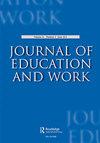探索新加坡建筑业终身学习的驱动因素和障碍
IF 1.7
Q2 EDUCATION & EDUCATIONAL RESEARCH
引用次数: 1
摘要
摘要随着技术的不断发展,新加坡建筑业越来越需要解决终身学习的参与问题。建筑行业的员工和工人有必要掌握技能和知识,以适应不断变化的世界。本研究试图通过考察驱动因素和障碍的动机理论,确定如何提高新加坡建筑业终身学习的参与度。在概念框架的建立下,本研究采用定量方法,采用问卷调查,并使用SPSS和SmartPLS 3.0软件对调查结果进行分析。分析结果有力地支持了自决理论(SDT)的使用,满足个人的能力、自主性和关联性这三个基本心理需求将对建筑行业终身学习的参与产生重大影响。这意味着这一理论在建筑行业的实际应用将逐渐增加个人对终身学习的参与。这项研究考察了动机和障碍的理论,结果表明两者对参与率的影响都很小。这项研究还将制度障碍确定为障碍领域中的一个关键因素,表明制度状况的变化可能有助于个人实现终身学习梦想。本文章由计算机程序翻译,如有差异,请以英文原文为准。
Exploring the drivers and barriers to lifelong learning in Singapore’s construction industry
ABSTRACT With the ongoing evolution in technology, there is an increasing need to address participation in lifelong learning in Singapore’s construction industry. It is necessary for employees and workers in the construction sector to acquire skillsets and knowledge to adapt to the ever-changing world. This study attempts to identify ways to increase participation in lifelong learning in the construction industry in Singapore by examining motivational theories for drivers and barriers. With the establishment of the conceptual framework, this study adopts a quantitative approach, using a questionnaire survey, the results of which are analysed using the SPSS and SmartPLS 3.0 software. The result of the analysis strongly supports the use of self-determination theory (SDT) and the fulfilment of three basic psychological needs – competence, autonomy, and relatedness of individuals – will produce a significant effect on the participation of lifelong learning within the construction industry. This means that the practical use of this theory in the construction industry will gradually increase individuals’ participation in lifelong learning. This study examined theories of amotivation and barriers, and both were demonstrated to be insignificant affecting participation rates. This study also identified institutional barriers as a key factor within the barrier domain, suggesting that changes in the institutional situation may help individuals to fulfil their lifelong learning dream.
求助全文
通过发布文献求助,成功后即可免费获取论文全文。
去求助
来源期刊

Journal of Education and Work
EDUCATION & EDUCATIONAL RESEARCH-
CiteScore
2.70
自引率
14.30%
发文量
40
期刊介绍:
The Journal of Education and Work is an international forum for academic research and policy analysis which focuses on the interplay of the education and economic systems. The journal examines how knowledge, skills, values and attitudes both about and for work and employment are developed within the education system. The journal also explores the various forms of industrial training and accreditation in the economic system, including changes in the economic and industrial infrastructure which influence the type of employees required. Work in the informal economy is also included.
 求助内容:
求助内容: 应助结果提醒方式:
应助结果提醒方式:


